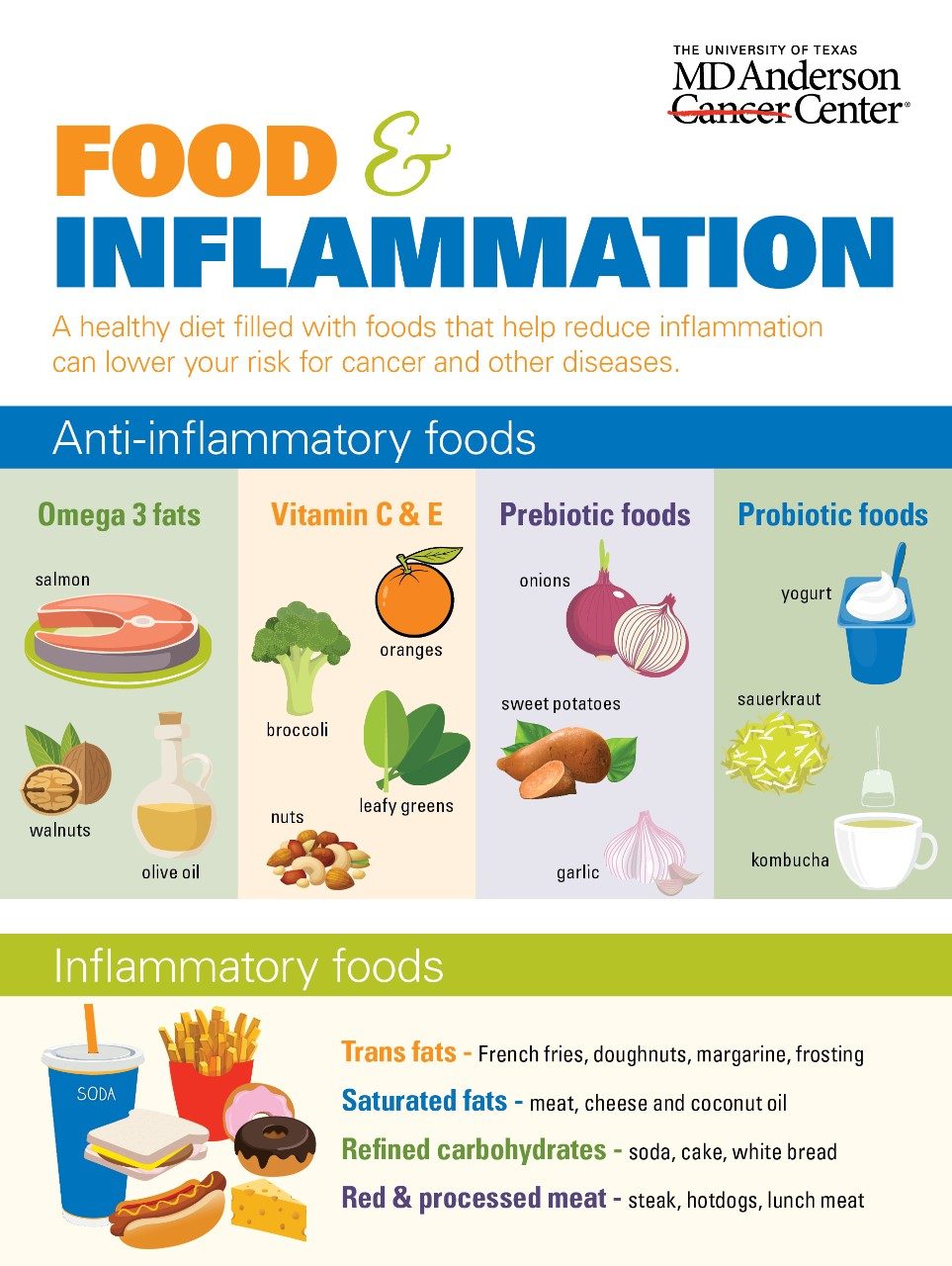Which foods can reduce inflammation?
Depending on what you eat, your diet may cause or reduce inflammation.

Depending on what you eat, your diet may cause or reduce inflammation.
Inflammation is the body’s response to injury or infection. Without it, we would be defenseless against everything from bee stings to deadly pathogens.
Many factors affect inflammation, and your diet is just one of them.
“Inflammation is basically an immune response to any kind of threat that your body sees, like bacteria, toxins or allergens,” says Lindsey Wohlford, a wellness dietitian at MD Anderson. “Sometimes, food is the threatening agent that causes your body to react with inflammation.”
That inflammation can make existing illnesses worse and raise your risk for several diseases, including cancer.
For example, if you already have arthritis, irritable bowel syndrome or another chronic disease related to inflammation, consuming inflammatory foods may trigger the symptoms. Or, if you have IBS, you might see an increase in bloating or intestinal pain.
“Over time, inflammation can cause cell damage and increase your risk for chronic diseases like heart disease and cancer,” Wohlford says. “Many cancers are triggered in response to inflammation.”
Foods that increase inflammation
If you are trying to manage inflammation, Wohlford suggests you avoid unhealthy fats and some other foods.
Trans fats, also called hydrogenated or partially hydrogenated oils, increase the shelf life of processed foods. They also make your doughnuts airy and your French fries crispy. But these hydrogen-infused fats also trigger inflammation.
Saturated fats are found in animal products like meat, cheese and even coconut oil. “Coconut oil is by no means a health food,” Wohlford says. “Use it in moderation.”
Omega 6 fats are found in plant-based cooking oils like sunflower, safflower, corn and soybean oils. When consumed in large amounts, they may promote inflammation.
Carbohydrates are a necessary part of a healthy diet. But refined carbs that are low in fiber and high in sugar can cause weight gain and promote inflammation. Choose whole-grain products, and skip the cake and soda.
Red meat includes beef, pork and lamb. Processed meat includes hot dogs, lunch meats and sausage. Both are linked to inflammation and increased cancer risk. Opt for fish and plant-based proteins like beans.
Foods that reduce inflammation
Avoiding inflammatory foods is a great start in getting healthy. Wohlford suggests a number of foods that do double-duty. They provide important nutrients and they help reduce inflammation.
Omega 3 fats are found in flaxseed, walnuts and fatty fish like salmon. They are also found in olive and canola oils, which make healthy substitutes for the cooking oils such as sunflower, safflower, corn and soybean oils.
Vitamin C and vitamin E are important nutrients that also fight inflammation. Get vitamin C in citrus fruits and vegetables. To get more vitamin E, try seeds, nuts and leafy greens.
Prebiotic foods promote the growth of good bacteria in your gut. Prebiotic foods include artichokes, onions, whole grains, asparagus, leeks, garlic, sweet potatoes and legumes.
Probiotic foods contain healthy bacteria. Probiotics include fermented foods like yogurt, kefir, kimchi, sauerkraut, miso, tempeh and kombucha. If you are going for the yogurt, opt for plain and add your own fruit.
There is no magic group of foods that you can add or avoid that will prevent cancer. But eating a plant-focused diet will reduce your risk.
“The more natural whole food we consume, the better,” says Wohlford. “Limit bags, boxes and cans as much as possible.”




